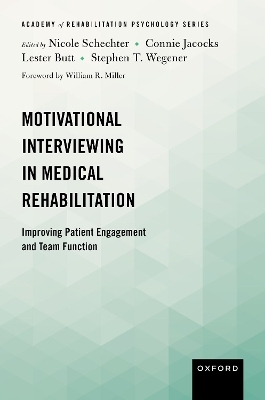
Motivational Interviewing in Medical Rehabilitation
Oxford University Press Inc (Verlag)
978-0-19-774826-8 (ISBN)
Motivational interviewing (MI) is an evidenced-based approach shown to change behaviors and increase engagement in many patient populations. The foundational concepts and skills of MI emphasize building a collaborative relationship in which the person's autonomy is respected and their personal goals are clarified and pursued, empowering individuals towards goal attainment and independence, consistent with the ethos of rehabilitation settings. The goals of the book are to 1) provide rehabilitation professionals with the knowledge of MI; 2) describe how this approach can be applied by a range of rehabilitation professionals working with persons with a wide range of impairments and chronic health problems; and 3) deliver strategies for implementing MI training and evaluation in rehabilitation settings.
Nicole Schechter is a board-certified rehabilitation psychologist and Assistant Professor of Physical Medicine and Rehabilitation in the Johns Hopkins University School of Medicine. Her clinical activity is focused on providing psychological services to persons with traumatic injuries and chronic illness. She also focuses on developing and implementing communication interviewing training programs in healthcare organizations to improve health care professional skills, patient satisfaction, and health outcomes. Connie Jacocks is a board-certified clinical neuropsychologist and the founder of Vista Neuropsychology. She has extensive experience in neurorehabilitation having served on the faculty in the Johns Hopkins Department of Physical Medicine and Rehabilitation and the staff of Craig Rehabilitation Hospital. Clinical research interests include the integration of motivational interviewing into a variety of treatment settings and modalities to increase patient participation and engagement. Lester Butt is a Senior Psychologist at Craig Hospital and past Department Chair of the Department of Psychology Department. He is a Fellow in the Divisions of Psychotherapy, Trauma, and Rehabilitation Psychology in the American Psychological Association. His clinical foci involve neurorehabilitation with persons with spinal cord injury, treatment modalities, bioethics, and quality of life post-disability. Stephen T. Wegener is Professor of Physical Medicine and Rehabilitation and Director of the Division of Rehabilitation Psychology and Neuropsychology in the Johns Hopkins School of Medicine. He also serves as Professor of Health Policy and Management in the Johns Hopkins Bloomberg School of Public Health. His clinical activity focuses on providing psychological services to persons with traumatic injuries and chronic illness. His research focuses on theories and projects that improve function and reduce disability following injury or illness. These projects emphasize the importance of patient-centered care models, self-management by patients and the use of motivational interviewing by providers.
Section 1: Foundations
Chapter 1: Motivational Interviewing: Philosophical Underpinnings and Spirit
Lester Butt and Stephen T. Wegener
Chapter 2: Application of Motivational Interviewing in the Rehabilitation Environment: An Overview
Katherine S. Wright and Charles Bombardier
Chapter 3: Motivational Interviewing Communication Skills: An Overview
Nicole Schechter and Stephen T. Wegener
Section 2: Addressing Common Barriers to Rehabilitation Engagement
Chapter 4: Treatment Plan Participation and Adherence
Kathleen T. Bechtold and Joe Fangman
Chapter 5: Self-Management Tasks
Danbi Lee, Maureen Gecht-Silver, and Linda Ehrlich-Jones
Chapter 6: Team Dynamics
Emily Markley and Ruth Grenoble
Chapter 7: Transitions Between Treatment Settings
Sarah Horan and Allie Hamilton
Chapter 8: Anxiety and Depression
Charles H. Bombardier
Chapter 9: Substance Use
Amanda Choflet and Jen Rickard
Chapter 10: Cognitive Impairment
Connie Jacocks and Kristen Mascareñas Wendling
Chapter 11: Family and Caregiver Dynamics
Asma Ali and Connie Jacocks
Section 3: Implementation and Evaluation
Chapter 12: Training, Training Resources, and Evaluation
Nicole Schechter and Laura Torres
Chapter 13: Quality Improvement and Research
Amanda Choflet, Annette Lavezza, and Kelly Daley
| Erscheinungsdatum | 20.01.2024 |
|---|---|
| Reihe/Serie | Academy of Rehabilitation Psychology Series |
| Verlagsort | New York |
| Sprache | englisch |
| Maße | 165 x 226 mm |
| Gewicht | 386 g |
| Themenwelt | Geisteswissenschaften ► Psychologie ► Biopsychologie / Neurowissenschaften |
| Geisteswissenschaften ► Psychologie ► Klinische Psychologie | |
| Medizin / Pharmazie ► Medizinische Fachgebiete ► Medizinethik | |
| Medizin / Pharmazie ► Physiotherapie / Ergotherapie ► Rehabilitation | |
| Sozialwissenschaften ► Pädagogik ► Sozialpädagogik | |
| Sozialwissenschaften ► Soziologie | |
| ISBN-10 | 0-19-774826-0 / 0197748260 |
| ISBN-13 | 978-0-19-774826-8 / 9780197748268 |
| Zustand | Neuware |
| Informationen gemäß Produktsicherheitsverordnung (GPSR) | |
| Haben Sie eine Frage zum Produkt? |
aus dem Bereich


